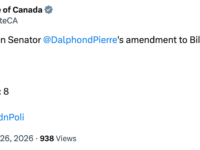Blog
Nobody Wants This: Senate Rejects Government’s Anti-Privacy Plan for Political Parties By Sending Bill Back to the House With a Sunset Clause
Faced with a bill that would leave political parties subject to weaker privacy rules than virtually any other major organization in Canada, the Senate voted yesterday to amend the bill by including a sunset clause on the privacy provisions that gives that the government three years to come up with something better. The change is designed to allow the new rules, which as the Senate heard repeatedly from experts and privacy commissioners are not real privacy rules at all, to apply immediately but expire in three years. This will have the effect of killing a B.C. privacy challenge that sparked the legislation in the first place. The bill heads back to the House of Commons, where the government can either accept the change and have the bill pass or reject the change and send it back again to the Senate. If it is sent back, the Senate is unlikely to oppose the privacy elements in the bill again.
Time for the Government to Fix Its Political Party Privacy Blunder: Kill Bill C-4’s Disastrous Privacy Rules
Just weeks after last year’s election, Mark Carney’s government committed not one, but two privacy blunders in rapid succession. First, Bill C-2 – literally the first substantive bill of the new government – buried lawful access provisions in an omnibus “border measures” bill that would have established unprecedented warrantless access to the personal of information of Canadians. Second, days later it introduced Bill C-4, which was framed as affordability measures bill but included provisions that exempt political parties from the application of privacy protections. The bizarre assault on privacy felt like an opportunistic attempt to insert unpopular rules in the hope that few were paying attention. The strategy was failure: the government ultimately introduced a new border measures bill with lawful access removed (new lawful access rules are expected in their own bill this year) and now a Senate committee which studied the Bill C-4 privacy rules has recommended that they be killed, removed from the bill, or subject to a two-year sunset clause.
Court Ordered Social Media Site Blocking Coming to Canada?: Trojan Horse Online Harms Bill Clears Senate Committee Review
Critics of Senator Julie Miville-Dechêne’s successive bills that ostensibly target pornography sites have for years warned of the privacy and equity risks that arise from mandated age verification and the dangers of over broad legislation that would extend far beyond pornography sites by covering social media, search, and AI services. The Senate committee reviewing the latest iteration of those bill – Bill S-209 – met yesterday to conduct a clause-by-clause review of the bill. That the bill passed through committee pending some supplementary remarks was not a surprise. However, that the privacy and equity concerns barely merited a mention and that regulating social media sites was viewed as feature not a bug was a wake up call.
An Illusion of Consensus: What the Government Isn’t Saying About the Results of its AI Consultation
The government quietly released a “what we heard” report this week discussing the response to its 30-day sprint AI consultation from last October. Described as the “largest public consultation in the history of ISED”, the report relies heavily on AI for its analysis as the government notes that it used “Cohere Command A, OpenAI GPT-5 nano, Anthropic Claude Haiku and Google Gemini Flash to read through the submissions and identify common themes.” Given that it received 64,600 responses to 26 questions, it says AI enabled it to shrink a process that would typically take many months into a matter of weeks.
In addition to the public consultation survey, AI Minister Evan Solomon formed a 28 person expert committee that provided the government with 32 different papers and reports. Those documents were similarly subject to AI analysis with the “what we heard” report devoting several pages to the expert analysis and recommendations. Yet unlike the public survey responses, the government has posted all the experts’ reports, which allows the public to see the actual advice alongside the government’s summary of it.
Since the government used AI to summarize the expert reports, I thought I would do the same.
Government Says There Are No Plans for National Digital ID To Access Services
The government has confirmed that it has no plans to create a national identification system. The issue arose in a sessional paper response released this week to a question from Conservative MP Marilyn Gladu. Gladu asked “With regard to the government’s implementation of a digital identification that will be mandatory to access government services and pay taxes: what is the plan and progress of the government on the implementation of a digital identification and what are the implementation dates for each phase?” The government’s short answer: “the Government of Canada is not implementing a federal or national digital identification credential.”











